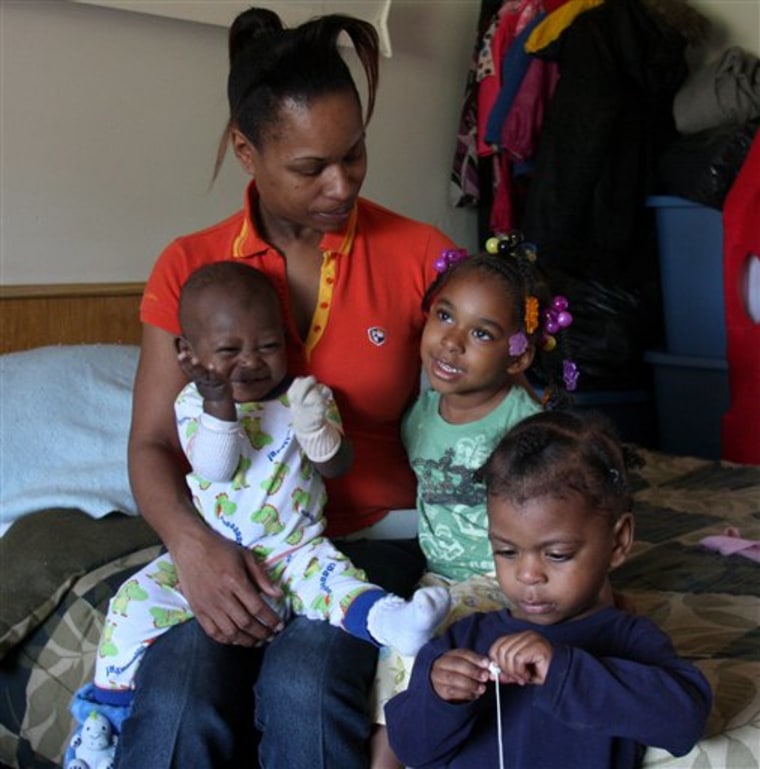Living in a homeless shelter with her teenage son and three young grandchildren, Margo Kindred needed help, and Michigan was supposed to provide it. But she couldn't get welfare benefits without her Colorado birth certificate, and couldn't get the document without $10.
Ten dollars she didn't have.
"I couldn't squeeze it out, because there was nothing left to squeeze," the 38-year-old said.
Michigan is one of the few states that give health care coverage automatically to children and adults on welfare. But there's a catch: Proof of citizenship is required.
States vary in what they require
Michigan and Nebraska appear to be the only states so far that won't give cash assistance unless proof of citizenship is shown, although Missouri is joining their ranks. Some states, such as Virginia, require applicants to show a birth certificate or Social Security number. But they allow applicants to sign an affidavit of citizenship if they can't provide the documents. Michigan and Nebraska don't have that out.
The proof of citizenship requirements are being promoted as a way to keep people who are in the country illegally from getting government assistance. But they go beyond having to show a driver's license or proving that, as a foreign resident, a person is in the country legally.
Critics say many people are being forced to wait weeks or even months for help while they get their paperwork in order, while some are so discouraged by the requirement that they don't even apply.
A federal study last year showed that the number of people getting Medicaid coverage dropped in many states after the new requirement was put in place on the federal level. Advocates for the poor in Michigan say the same is happening now to welfare applicants in the state.
"People are not getting the help they need and they're eligible for," said Sharon Parks of the Michigan League for Human Services in Lansing. "It's not right."
For many, like Kindred, the requirement is a surprise. A women's group in Battle Creek eventually put up the money, and state officials approved her payments.
Until they started last month — adding $91 to her monthly $598 check — Kindred got by on the children's welfare payments and the food stamps she was able to get because that program didn't require a birth certificate. All the welfare money went to house the family at a small motel they moved to from the homeless shelter.
"It's a struggle to get Pampers or personals, wash clothes," Kindred said.
Rules keeping out eligible people?
The Michigan League contends the Michigan rules are keeping eligible people from getting welfare payments, and points to the discrepancy between food stamp and welfare caseloads.
Despite the state's weak economy, Michigan's May welfare caseload was down to its lowest level since December 2002, having dropped by 18 percent in the past year alone.
Yet the food assistance program — which allows people to qualify with far more income — set a record high last month. The number of households getting food stamps has increased about 70 percent since December 2002.
"It's troubling to see the cash assistance numbers falling when we know that the level of need throughout the state is growing," Parks said.
But a director in the Michigan Department of Human Services said the tougher proof of citizenship requirements aren't solely responsible for the decrease. Michigan also has made its work requirements more strict.
"Less people may be applying because of eligibility issues," said Barbara Anders, director of the Bureau of Adult and Family Services. "I don't think we can say it's any one item."
In Nebraska, applicants must show a birth certificate or some other proof of citizenship to get food stamps, welfare payments, medical coverage for children and seniors who are disabled or blind, and for help paying energy bills.
That state hasn't seen the large drop in welfare caseloads Michigan has seen because the state will pay for applicants' birth certificates, removing that hurdle, said Becky Gould of the Nebraska Appleseed Center for Law in the Public Interest.
More states are considering proof of citizenship for a variety of programs. Missouri recently passed into law a bill requiring people to prove they are U.S. citizens or legally in the country when applying for food stamps, housing and other public benefits.
